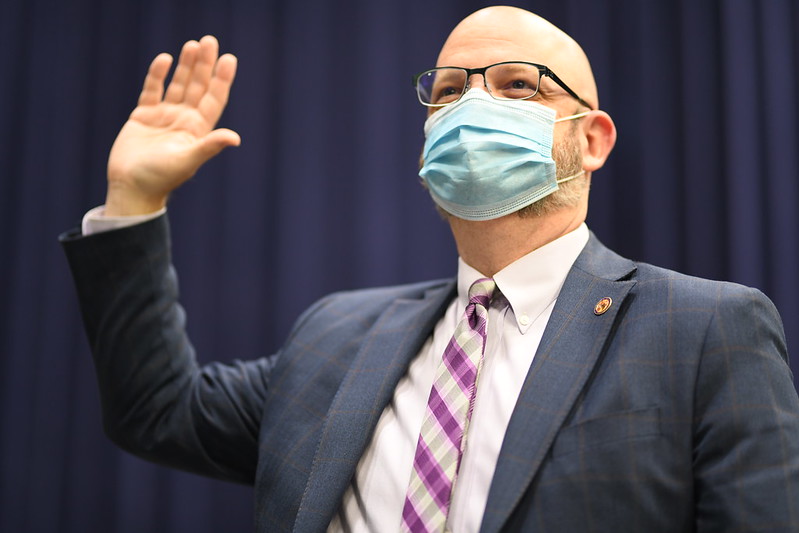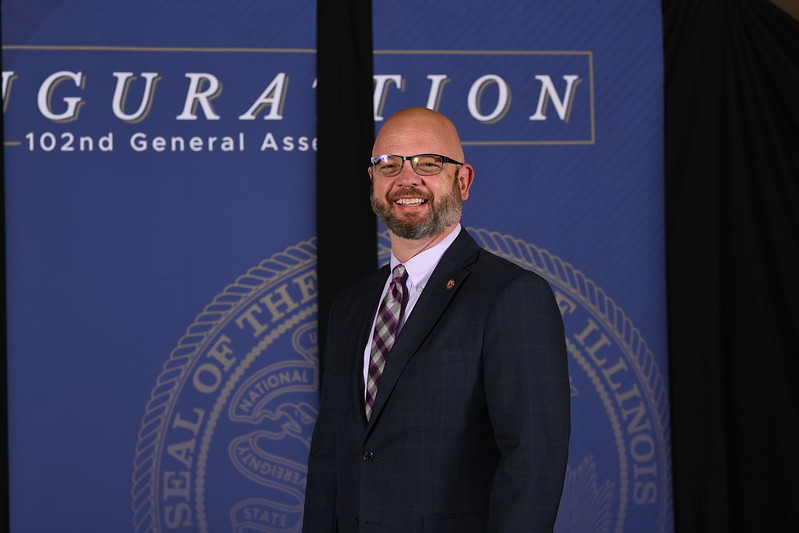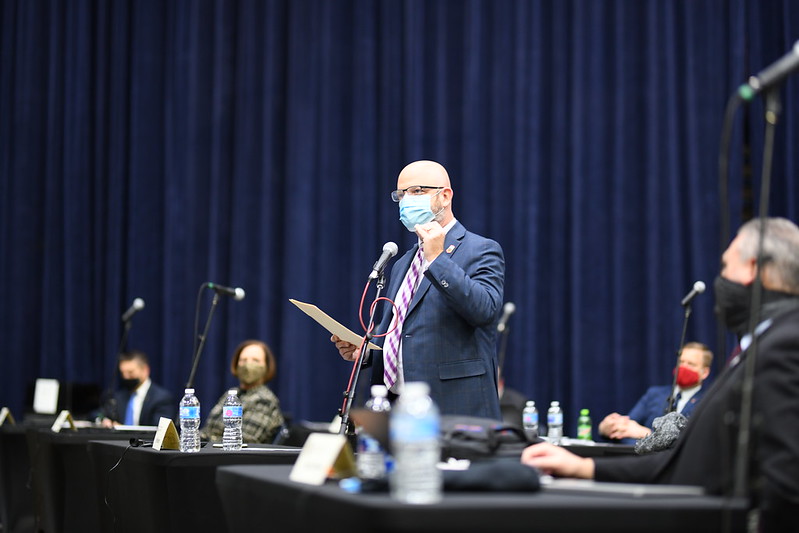Greetings,
Last week at the House inauguration ceremony of the new 102nd General Assembly in Springfield, I had the opportunity to give a speech. While the purpose of the speech was to second the nomination of Jim Durkin to be Speaker of the House (he was instead re-elected Minority Leader) I would like to share a portion of my remarks with you that speak to the aspirations we share as Illinoisans at this historic moment in our journey:
Each of us is here today because the people of our district have entrusted us with the responsibility and the privilege of serving as their voice in this House.
What makes serving as a member of this body such a tremendous honor is how each of us brings our own unique personal story to the fabric of Illinois’ democratic process.
Our 118 individual journeys of family, education, professional experience and civic engagement intersect here in this place, at this moment, for this exceptional opportunity to begin writing the first page of a new chapter in our beloved state’s collective journey…
Collaboration is often at the core of every accomplishment we have been able to make here in the House of Representatives. No one member on either side of the aisle can succeed without the support of the men and women we serve alongside…
And while we often put too much focus these days on the negative, we owe it to our state and constituents to appreciate the extent of our greatness…
The health care workers in our state, as I’ve seen firsthand at Northwestern Medicine in DeKalb, have accomplished incredible things in just the past 9 months.
The imprint Illinois-based technology has had in our world is nearly unrivaled. The Facebook data center being built in my district and the work at Discovery Partners Institute show we continue to reach towards more greatness in our state.
I have great optimism in the future. I have great optimism in Illinois’ future. We are amazing people. We are a loving people. We are a feisty people. And often our frustration and anger is born of the fact we know we can do better.
Our faith in Illinois needs to be greater than our doubt.
With these thoughts in mind, and with confidence in Illinois’ future, I hope you scroll below for a recap of January’s legislative activity.
-Jeff

Democrats Push Through Aggressive Agenda in Final Hours of 101st General Assembly
In their rush to send several bills to the Governor before the end of the 101st General Assembly, House and Senate Democrats filed 6,386 pages of legislation during the five-day lame duck session. Senate Minority Leader Dan McConchie said it best: “That’s like reading The Bible, Lord of the Rings trilogy, and the entire Harry Potter series in five days. Not. Physically. Possible.”
In the House, we held marathon session days lasting until 2:30 AM on Monday night and until 4:15 AM on Tuesday night as Democrats pushed their agenda. Most of the legislation carried hefty price tags and foisted a great number of new, costly unfunded mandates on schools, businesses and local units of government. One of the Democrats’ bills had an estimated cost to the state of between $900 million and over $2 billion.
In all, 23 bills were sent to the Governor for his signature. Most of the new spending was tied to a package of bills from the Legislative Black Caucus that seek to end perceived systemic racism in Illinois. The caucus’ bills fell into four categories: criminal justice reform (HB 3653); education and workforce development (HB 2170); economic access, equity and opportunity (SB 1480, SB 1608, SB 1792, and SB 1980); and healthcare and human services. Legislation related to health care and human services did not advance to the Governor during the lame duck session, but is expected to be re-filed in the 102nd GA.
The most controversial of the Black Caucus reform bills was a partial overhaul of the criminal justice system in Illinois. With several amendments added throughout the five-day session, the final bill, which was more than 760 pages long, dropped in the Senate at about 4:00 AM on Wednesday, with the vote taking place just an hour later. The bill was then sent to the House, where a heated debate was truncated by the Democrats so the House vote could take place prior to the Constitutionally-mandated swearing in of the 102nd General Assembly at noon on that same day.
Please know that I am not opposed to criminal justice reform. Despite the effort to address important issues that most folks, including law enforcement, could have found common ground on, I am chiefly disappointed the process took the path that it did to rush these massive changes through a lame-duck session. Late amendments did remove a provision or two that our law enforcement community sought, but much that remains in the final bill may be an overreach with consequences harmful to effective policing and community safety. I hoped to see us accomplish meaningful progress on issues of racial justice and social equity in a way that brings us all together instead of further divide us. As we look ahead to meeting other challenges this year, that remains my goal.
Let me restate, this package implemented elements supported by law enforcement. It also included elements that should have been allowed to have law enforcement input, public hearings on the actual language in the bill and open vetting with more than 8 hours left in the legislative session. The process isn’t what we should have seen and it eliminated feedback from important groups impacted by what was passed.
HB 3653 passed with 60 Democrats (the minimum number of votes needed – NOT all Democrats voted for this bill) voting in favor of it. Among other things, HB 3653:
- Mandates the use of body cameras on all officers in all police departments by 2025, with no state funding to help cover the massive cost;
- Ends cash bail for all criminal offenses;
- Implements new rules for use of force;
- Eliminates a current requirement that a sworn affidavit accompany a complaint against a police officer and allows for anonymous complaints;
- Provides for decertification of bad cops using the relaxed complaint rules;
- Increases rights for detainees;
- Decreases rights for victims.
Again, some components are positive, but in my opinion the bill needed a lot more work. Those opposing the bill complained about process as much as the content of the legislation. No Republicans in the House or Senate supported the bill. But the concerns were bipartisan, Democrats voted against it as well.
In addition to the other measures from the Legislative Black Caucus, some of the other bills passed during the lame duck session include:
- SB 54: Allows bars and restaurants to sell “alcohol to go” through third party vendors like GrubHub
- HB 2451: Increases retirement benefits for Chicago firefighters by removing a provision that prevented some firefighters from receiving an automatic annual 3% cost of living increase.
- HB 1559: Expands the Chicago Teachers’ Union’s ability to go on strike.
- HB 3360: Increases the amount of damages an individual can collect from personal injury or wrongful death cases by allowing for the accrual of interest earlier in the legal process.
- HB 2488: Addresses opioid abuse by creating a nationwide database where prescribing physicians can track prescriptions for individual people.
We did have one significant victory literally in the middle of the night while no one was watching, however, that stopped a $1 billion tax increase on struggling small businesses (440,000+ LLC’s and S-Corporations ONLY) when House Republicans fought back against an effort to “decouple” Illinois’ tax law from the CARES Act which passed in March. The Governor proposed this decoupling by putting it into a bill that Republicans generally supported, hoping, I’m sure, that we’d let it through so we could get the other things that we wanted. Instead, we waged a vigorous debate and the measure fell 10 votes short of passage. This attempt to retroactively increase taxes under the cover of darkness (1 A.M.) upon the very businesses that need help the most under COVID was one of the most cynical things I’ve ever seen here in Springfield, and that’s saying a lot.
Lame Duck Legislation Action Overshadowed by Ousting of Speaker of the House Mike Madigan
The legislation sent to the Governor during the lame duck session was substantial. But the entire week’s events were overshadowed by the ousting of Mike Madigan as Speaker of the House.
Mike Madigan served as Speaker of the House every year except for two since 1983. His grip on power remained firm in recent years despite some of his top allies being ensnared in a massive federal investigation into political corruption in Illinois. In a series of indictments, Speaker Madigan was implicated as “Public Official A.” In fact, in federal documents Public Official A was named nearly 100 times as a key player in a bribery scheme involving Commonwealth Edison. It’s important to note that as of this writing, Madigan has not been charged with any crime and he has continually stated his innocence. He’s also faced problems within the Democratic Caucus in recent years when sexual harassment claims from within his office and his campaign organization were made public.
A total of 21 House Democrats stood together and essentially ended Speaker Madigan’s reign in the House of Representatives. They refused to vote for him to retain the Speakership during a straw poll during the early days of the lame duck session, which put him short of the 60 votes he needed. Madigan ultimately withdrew his name from consideration and Hillside Democrat Emanuel “Chris” Welch emerged as the frontrunner and eventual winner. During the official vote for House Speaker, almost every House Democrat voted for Welch.
The departure of Mike Madigan as Speaker of the House represents the end of an era in Illinois. Without the Speaker’s gavel and the power that comes with it, it’s considered likely that he will resign from the House of Representatives in the near future. His reign was unprecedented. He held the gavel during the terms of nine Illinois Governors, nine Chicago mayors and eight U.S. Presidents.
The first major task for Speaker Welch will be the approval of House Rules for the 102nd General Assembly. We will soon find out if our new Speaker will truly turn the page or if he will continue ruling from the Book of Madigan. Nothing changes in Illinois until the House Rules change. I am hopeful that Speaker Welch will do things differently.
House of Representatives to Return in Early February
After Inauguration Day on Wednesday, the House convened for a short while on Thursday before adjourning until February 2, or until Speaker Welch calls us back (there is talk of us returning to take up a few bills before the end of January). We will spend the next few weeks back at home in our districts, tending to the needs of our local constituents. Click here to view the 2021 House Session calendar.
In the coming weeks I will be filing my bills for this new session year. I will continue to focus on taxpayer protections, government accountability, improvements at state agencies like DCFS and IDES, strengthening higher education and supporting our agriculture industry. As always, you can follow my legislation HERE.
Ongoing Items I am Watching
As many of you are aware, I have been fighting for several things that have long gone unaddressed by our Governor to the frustration of so many of you that have contacted my office. Among them are:
- LaSalle Veteran’s Home deaths and safety
- Unemployment department (IDES) response delays
- Unemployment department (IDES) fraud filings
- COVID-19 business operating impacts and confusion
- Backlog in FOID and CCL applications
- Expansion of COVID testing capabilities in our communities
- Plans for safe school operations and reopening
- Plans for a return to sports for both school and recreational
- Clear and understandable expectations for the rollout of the vaccine
I want you to know these are issues we continue to hear about weekly in my office. We continue to ask the Governor to address these issues. He has a lot on his plate, of course, but the frustration that I continue to hear from my constituents has gone on too long. I continue to advocate, within the role you have elected me, for him to take ownership and point out in a clear way where we are heading. Not just where we are today.
Finally, I want to say thank you to those of you who have reached out and shared your personal stories. I have heard from so many of you on the victories, frustrations, and helplessness you’ve felt over the past year. I know it has not always been easy. For many of you it still seems like a dark road ahead.
I have a strong optimism for the future of our state. To get to the place where we all feel a sense of improvement, we need to walk there together. So please join me and while holding Illinois accountable to the residents, give her a sense of encouragement.
Thank you for taking the time to read my e-newsletter. It is a tremendous honor for me to serve as your voice in Springfield. If you have any questions or concerns about any information contained in this newsletter or other state issues, please feel free to contact me.

